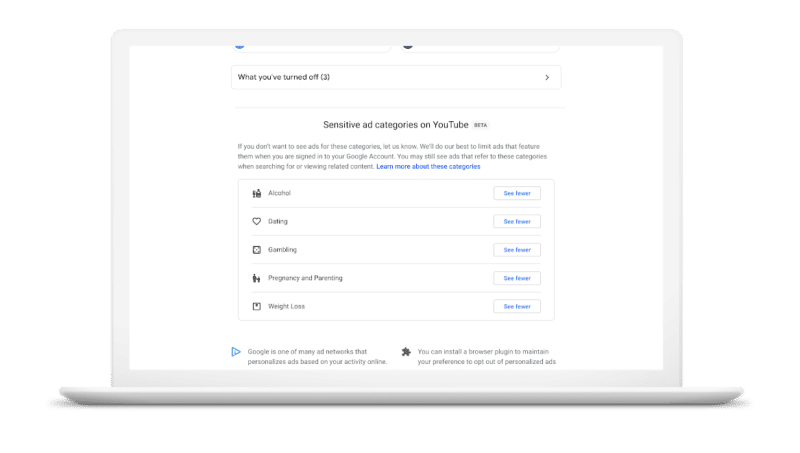Users can opt-in if they want to see fewer YouTube and Google Display ads for pregnancy, parenting, dating and weight loss.
- Pregnancy and parenting.
- Dating.
- Weight loss.
The company today announced a global expansion of user controls that were introduced in 2020, which limited alcohol and gambling ads.
YouTube and Google Display ads. Initially, users could only limit alcohol and gambling ads on YouTube. With today’s announcement, users can now also limit these ads on Display. Users can also choose to limit the three new ad categories on both YouTube and Display.
Fewer, not zero. There’s an important distinction here: Google only limits these types of ads. That doesn’t mean a user will never, at some point, see a weight loss or gambling ad. It simply means they will see “fewer” of them.
As we noted in 2020, short of an ad ban, it’s nearly impossible to guarantee that a user who opts out will never see an ad in one of these categories.
Given the sensitive nature of these categories, there may be additional restrictions, depending on your country.
How users opt-out. This feature can be found in users’ Ad Settings, under the Google Account dashboard. Here’s what it looks like:

More to come? Google seems to be considering expanding this feature further. According to Karin Hennessy, Group Product Manager for Ads Privacy:
“People want more control over their ads experience, including blocking ads or categories they prefer not to see. Providing transparency and control has always been a priority for us so we’re expanding our tools, enabling the choice to see fewer pregnancy & parenting, dating, and weight loss ads. We’ll continue to listen to user feedback and study which categories to expand this feature to in the future.”
Why we care. This is a good move on Google’s part to allow users to limit the types of ads they see in sensitive categories. Because it’s opt-in, people need to know about the option and take the time to do it. I’ve asked Google how many people use the ad limitation feature and will update the article if/when I hear back.
The impact on marketers should be minimal. At worst, these controls may actually result in better ad targeting, as it should prevent people who are highly unlikely to convert from seeing your ads.

